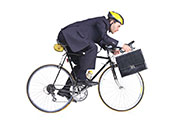- Could Your Grocery Store Meat Be Causing Recurring UTIs?
- Are You Making This Expensive Thermostat Error This Winter?
- Recognizing the Signs of Hypothyroidism
- 10 Strategies to Overcome Insomnia
- Could Artificial Sweeteners Be Aging the Brain Faster?
- Techniques for Soothing Your Nervous System
- Does the Water in Your House Smell Funny? Here’s Why
- Can a Daily Dose of Apple Cider Vinegar Actually Aid Weight Loss?
- 6 Health Beverages That Can Actually Spike Your Blood Sugar
- Treatment Options for Social Anxiety Disorder
Bicyclists Happier Than Drivers, Train Riders, Study Says


Riding a bike may benefit your mind as well as your body. People who use a bicycle to get from one place to another are generally happier than those who drive or use mass transit, according to a new study.
“We found that people are in the best mood while they are bicycling compared to any other mode of transportation,” said the study’s lead author, Eric Morris, an assistant professor of city and regional planning at Clemson University in South Carolina. “Bicyclists are generally younger and physically healthy, which are traits that happier people usually possess,” said Morris in a university news release.
The researchers examined how people’s emotions differed while they were traveling. Using data collected by the Bureau of Labor Statistics, they assessed feelings such as happiness, pain, stress, fatigue and sadness. The means of travel was also taken into account.
According to the study, recently published in the journal Transportation, bicyclists are a distinct group of people who generally love riding.
Trailing behind bicyclists, car passengers are the second happiest travelers. Car drivers came in third.
At the opposite end of the spectrum, bus and train riders are the unhappiest travelers. But trains and buses are usually used to commute to work, which might explain why folks taking these forms of transportation are less enthusiastic.
Commuters’ emotional experience is as important as speed and travel time, the researchers said.
“Understanding the relationship between how we travel and how we feel offers insight into ways of improving existing transportation services, prioritizing investments and theorizing and modeling the costs and benefits of travel,” said Morris.
More information
The U.S. Department of Transportation has more on the benefits of walking and bicycling.
Source: HealthDay
Copyright © 2026 HealthDay. All rights reserved.










